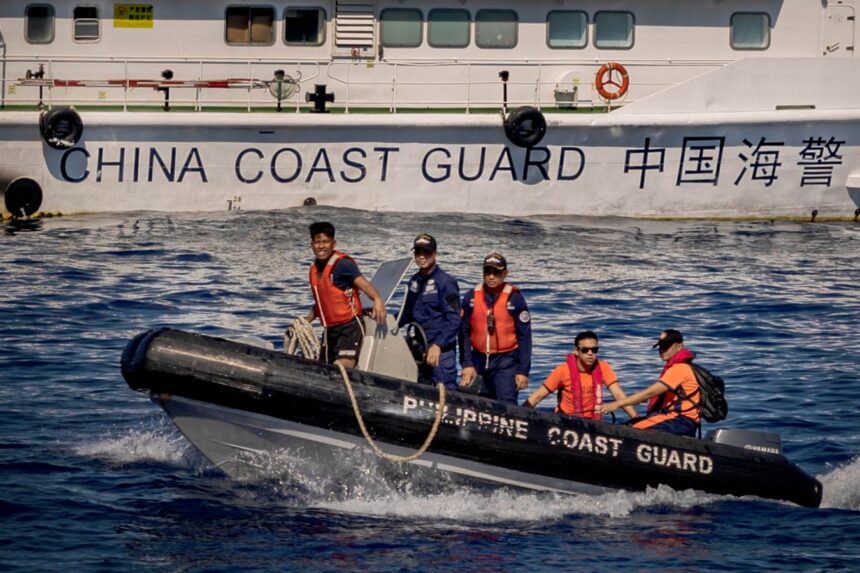South China Sea – March 5: Philippine Coast Guard personnel pass the coast of China in a rubber boat … [+]
The People’s Republic of China has built a legal wall to preserve Americans’ data, justify violations of the human rights of its own citizens and foreigners, and legitimize violations of the sovereignty of its neighbors. In response, Congress has asked the Department of Defense to produce a PowerPoint.
For the first time, the House and Senate Armed Services Committees have become aware of the threat of legal warfare from China and other adversaries, asking the Department of Defense to provide a briefing on the threat of adversary legal warfare, also known as legal warfare. While this briefing is an important step in the military council’s efforts to combat hostile laws, it is far from sufficient given the nature of the threat. China views legal warfare as a pillar of its overall civil-military integration strategy and is actively working to reshape the rules-based international order in favor of its interests. At the same time, the United States does not have an office dedicated to combating adversary law, nor does it have a single full-time employee. Congress must do more to safeguard the rights of Americans, American businesses, and the rules-based international order itself.
Defense Department recognizes threat from Chinese law
The Department of Defense is increasingly interested in threats of legal warfare from U.S. adversaries. Some combatant commands have counterlaw programs or projects led by their staff judge advocates or senior military attorneys. Last week, the Department of Defense released a report stating that China uses the law to support its illegal maritime and territorial claims in the South China Sea and Taiwan Strait and to impose restrictions on foreign businesses. Since 2000, Congress has required the Department of Defense to submit annual reports on military and security developments involving the People’s Republic of China. Unusually, this year’s report includes a section titled “Legal Framework,” detailing a series of Chinese laws passed in recent years as part of China’s so-called “Great Wall of Laws.” The report notes that these laws are integrated into the People’s Republic of China’s civil-military integration strategy, which utilizes all civilian elements of national power to support military and national strategic objectives. According to the People’s Republic of China, the purpose of the Great Wall of Law is to protect national security. However, the People’s Republic of China uses laws such as the Coast Guard Law and the Anti-Secession Law to support its illegal and coercive actions in the South China Sea, East China Sea, and Taiwan Strait.
The Chinese Communist Party also uses the Great Wall of Law as justification for surveillance and raids on foreign businesses, suppressing dissent and potentially delaying litigation in U.S. courts. The report lists twelve laws that are particularly relevant to the People’s Republic of China’s military might, as well as various export controls. Several laws, including the National Security Law, the Intelligence Law and the Counterintelligence Act, provide grounds for state surveillance of foreign individuals and businesses, particularly in the information and communications technology sector. The Anti-Terrorism Law requires telecommunications and Internet companies to provide information and technical support to social organizations investigating terrorism. The Cybersecurity Law and the Data Security Law jointly require companies to submit information and communications technologies to government review, store certain data within the People’s Republic of China, and seek government permission before transmitting certain data outside the People’s Republic of China.
Congressional request for legal briefs is inadequate and flawed
Congress is finally starting to worry about threats to the law. In September, I had the privilege of testifying at a hearing held by the House China Committee titled, “How the Chinese Communist Party Uses the Law to Suppress Critics and Enforce Its Rule.” The hearing discussed the long-term effects of China’s legal war, including China’s attempts to suppress the First Amendment rights of U.S. citizens, obstruct U.S. businesses, spy on foreign companies, and engage in deceptive business practices and vexatious litigation in national security-sensitive cases. Perhaps mindful of these trends, a joint House-Senate conference report accompanying the NDAA expresses concern about “foreign interpretations or applications of the law that intentionally challenge the rules-based international order,” including by China, Iran, Russia and North Korea. or applicable. The report requires the Department of Defense to provide a briefing on the issue within 180 days of the NDAA’s enactment.
This requirement is an important step, but it does not go far enough. I helped draft legislation regarding the Department of Defense’s role in supporting international legal operations that was included in the Senate’s draft defense authorization bill but was not adopted into the final text. The legislation would require the Secretary of Defense, along with other relevant agencies, to write a more detailed report on how the Department of Defense supports a whole-of-government strategy to counter international legal actions by adversaries. The draft legislation makes clear that the Department of Defense will play a supporting role in a whole-of-government strategy to combat adversary law.
Given the nature of the threat, a request for a briefing is not sufficient. The military commission’s report called for a brief briefing rather than the comprehensive report needed to assess the threat. There is no assurance that DoD will comply with this request within 180 days as this is not a legislative requirement. There is also no guarantee that the Department of Defense will devote enough resources to conducting a simple briefing. The biggest problem is that Congress cannot guarantee action based on any material it receives.
The public and private sectors must work together to confront China’s rule of law
The committee’s report was also flawed because the Defense Department briefing did not require consultation across the government. Strategies involving the entire government and the private sector are critical to combating legal adversaries. As a country governed by the rule of law, law is the basis for all actions in the United States. A rules-based international order allows free trade and American business to thrive. The separation of powers is part of the strength of American democracy, and America’s free market economy is a hallmark of American greatness. Yet China can seamlessly leverage civilian capabilities and entire markets to support its military, as well as countless data on foreign governments and entities—and has full legal authority to do so. The United States can only respond to this through a whole-of-government approach and private sector cooperation.
As the “2022 National Security Strategy” points out, the People’s Republic of China is the only competitor of the United States that has the willingness and ability to reshape the international order. The Philippines and China’s other neighbors in the South China Sea watch every day as China rewrites the rules in its own image. American rights and American businesses are crashing against the great legal wall of the People’s Republic of China. Congress needs more than a slideshow. It must act to create a research center to study the law, a government-wide anti-law strategy, and an office to lead that strategy.





